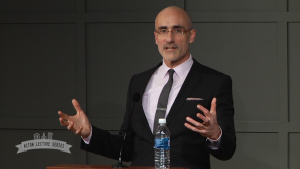


Every February Americans observe National African American History Month, a time set aside to celebrate the contributions that African Americans have made to American history. Here are five factsyou need to know about the history of the observance:
Virginia Civil Rights Memorial / Flickr (CC BY 2.0)
1. The precursor to National African American History Month was created in 1926 when historian Carter G. Woodson and the Association for the Study of Negro Life and History announced the second week of February to be “Negro History Week.” Woodson chose the second week of February to coincide with the birthdays of Abraham Lincoln, the author of the Emancipation Proclamation, and of Frederick Douglass, an early African-American abolitionist.
2. Woodson, the son of a slave, began high school at the age of 20 and then proceeded to study at Berea College, the University of Chicago, the Sorbonne, and Harvard University, where he earned a Ph.D. in 1912. Woodson founded the Association for the Study of Negro Life and History in 1915 to train black historians and to collect, preserve, and publish documents on black life and black people. He also founded the Journal of Negro History (1916), Associated Publishers (1922), and the Negro Bulletin (1937). Woodson spent his life working to educate all people about the vast contributions made by black men and women throughout history. The reason Woodson started Negro History Week was to ensure the legacy of black Americans would not be lost. He used the Jewish people as a model for black Americans:
If a race has no history, it has no worthwhile tradition, it es a negligible factor in the thought of the world, and it stands in danger of being exterminated. The American Indian left no continuous record. He did not appreciate the value of tradition; and where is he today? The Hebrew keenly appreciated the value of tradition, as is attested by the Bible itself. In spite of worldwide persecution, therefore, he is a great factor in our civilization.
3. The expansion of Black History Week to Black History Month was first proposed by the leaders of the Black United Students at Kent State University in February 1969. The first celebration of Black History Month took place at Kent State one year later, in February 1970.
4. In 1976 as part of the United States Bicentennial, the informal expansion of Negro History Week to Black History Month was officially recognized by the U.S. government. President Gerald Ford spoke in regards to this, urging Americans to “seize the opportunity to honor the too-often neglected plishments of black Americans in every area of endeavor throughout our history.”
5. In 1986 Congress passed Public Law 99-244 which designated February 1986 as “National Black (Afro-American) History Month.” This law noted that February 1, 1986 would “mark the beginning of the sixtieth annual public and private salute to Black History.” Since 1975, every U.S. President has issued a proclamation for the observance, though the names have often changed: Black History Week (1975), Black History Month (1976), National Afro-American (Black) History Month (1978), African-American History Month (1992), and National African-American History Month (1993).









